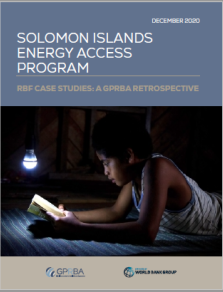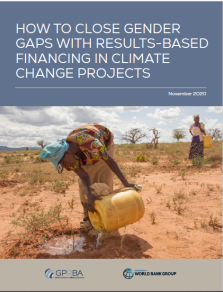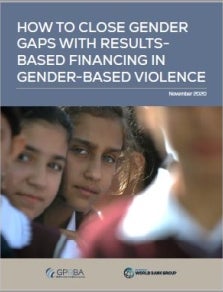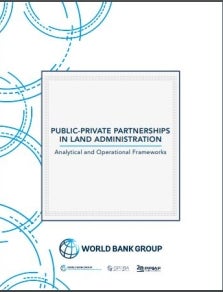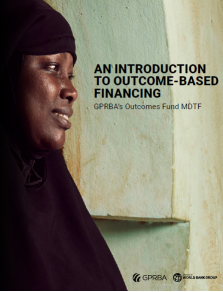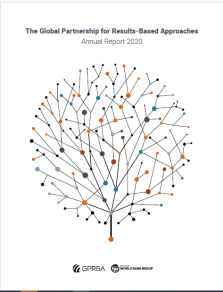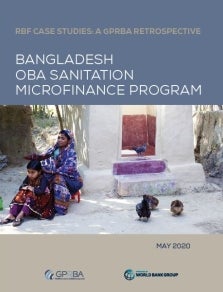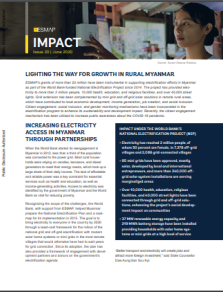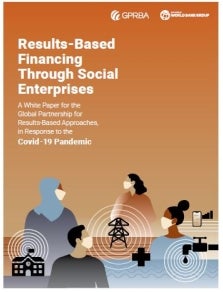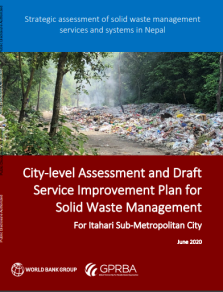Resources
-
Solomon Islands Energy Access Program
This case study is part of a series prepared by the World Bank’s Global Partnership for Results-Based Approaches (GPRBA). The objective is to highlight project components that have enabled GPRBA to successfully deploy Results-Based Finance (RBF) approaches for the provision of basic services to…
Solomon Islands Energy Access Program(3.2 MB)Date: 2020
Tags: Energy, Climate Change, Fragile Situations
Region: East Asia and Pacific
Country: Solomon Islands
-
How to Close Gender Gaps with Results-Based Financing in Climate Change Projects
This report serves as a tool to project teams working on Results-Based Financing (RBF) projects with a focus on combating climate change and its impact. It provides sector-specific entry points, key questions to consider, and sample objectives and indicators that can be used to consider how RBF…
How to Close Gender Gaps with Results-Based Financing in Climate Change Projects(4.09 MB)Date: 2020
Tags: Climate Change, Gender
Region: Global
Country: Global
-
How to Close Gender Gaps with Results-Based Financing in Gender-Based Violence
GBV is a global pandemic and a major public health problem. Intimate partner violence (IPV) against women is the most prevalent form of GBV. Globally, it is estimated that about 1 in 3 women who have ever been in a relationship report that they have experienced some form of violence (e.g. a…
How to Close Gender Gaps with Results-Based Financing in Gender-Based Violence(3.75 MB)Date: 2020
Tags: Gender
Region: Global
Country: Global
-
Public-Private Partnerships in Land Administration: Analytical and Operational Frameworks
This report "Public-Private Partnerships in Land Administration: Analytical and Operational Frameworks" comes one year after GPRBA's signing of the West Bank and Gaza Real Estate Registration program, its first project in land administration.
GPRBA co-authored and co-sponsored this…
Public-Private Partnerships in Land Administration: Analytical and Operational Frameworks(4.14 MB)Date: 2020
Tags: Land Administration
Region: Global
Country: Global
-
An Introduction to Outcome-Based Financing
The US$2.5 trillion annual financing gap for achieving the United Nations Sustainable Development Goals necessitates that existing resources are used more effectively and that additional resources are mobilized. Innovative funding approaches such as results-based financing (RBF) can contribute…
An Introduction to Outcome-Based Funding - GPRBA Brochure(1.16 MB)Date: 2020
Region: Global
Country: Global
-
GPRBA Annual Report 2020
In addition to showcasing the wide range of activities achieved during fiscal year 2020, this Annual Report sheds light on some of the many ways GPRBA continues to employ innovative results-based financing instruments to strengthen service delivery, incentivize long-term and sustainable change,…
GPRBA Annual Report 2020(14.35 MB)Date: 2020
Region: Global
Country: Global
-
Bangladesh OBA Sanitation Microfinance Program
This case study is part of a series prepared by the World Bank’s Global Partnership for Results-Based Approaches (GPRBA). The objective is to highlight project components that have enabled GPRBA to successfully deploy Results-Based Finance (RBF) approaches for the provision of basic services to…
Bangladesh OBA Sanitation Microfinance Program(1.35 MB)Date: 2020
Tags: Water and Sanitation, Gender
Region: South Asia
Country: Bangladesh
-
Lighting the Way for Growth in Rural Myanmar
This publication by the Energy Sector Management Assistance Program (ESMAP), GPRBA's partner in the Myanmar Solar Power project, describes its role in the World Bank-funded National Electrification project to provide universal access to the country's rural populations by 2030.
Since the…
http://documents1.worldbank.org/curated/en/213001592799592035/pdf/Lighting-the-Way-for-Growth-in-Rural-Myanmar.pdf, Lighting the Way for Growth in Rural Myanmar(464.46 KB)Date: 2020
Tags: Energy, Climate Change
Region: East Asia and Pacific
Country: Myanmar
-
RBF Through Social Enterprises: A White Paper in Response to the Covid-19 Pandemic
The COVID-19 pandemic has triggered a global humanitarian crisis, putting both lives and livelihoods at risk. In the initial stages of the pandemic – especially in contexts where the state machinery was caught unawares or lacked capacity, or both, social enterprises (SEs) or socially-driven…
Results-Based Financing Through Social Enterprises: A White Paper in Response to the Covid-19 Pandemic(4.25 MB)Date: 2020
Region: Global
Country: Global
-
City-level Assessment and Draft Service Improvement Plan for Solid Waste Management For Itahari Sub-Metropolitan City
By 2050, it is estimated that nearly half the world’s population will reside in cities. Bulging population in cities coupled with their rising income levels has led to an increase in the amount of waste generated by these urban centers. Cities and towns across the globe today face acute…
City-level Assessment and Draft Service Improvement Plan for Solid Waste Management For Itahari Sub-Metropolitan City(5.87 MB)Date: 2020
Tags: Solid Waste Management
Region: South Asia
Country: Nepal



